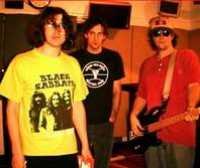Lou Barlow has been rolling in the Sebadoh for over ten years. And at long last, he's getting somewhere.
"We always gave each other so much room before, that it almost felt like we were making solo records under a band name."
Lou is speaking in the reflective glow of contentment at completing The Sebadoh, Sebadoh album number seven. It is by some margin the most cohesive Sebadoh record - though the same could have been (and was) said about each of its three predecessors. What really distinguishes The Sebadoh is its solid core, Sebadoh's core used to be palpably liquid, as each album took stylistic lurches around its protagonists' contrasting, sometimes conflicting, artistic impulses. No more. Where once we heard three voices screaming at once, occasionally to the detriment of the whole, now they talk in harmony. It's no less thrilling, but a whole lot stronger...
Harmony can be an elusive quality. Certainly, it's something Sebadoh has been striving towards ever since its inception back in '86/'87, when Lou Barlow began recording songs with help from his friend Eric Gaffney. Then, Sebadoh was an outlet for frustrated expression: Lou was bassist with Dinosaur, a group with a perversely undemocratic internal structure. With Eric, Lou made two albums of primitively performed folk songs, Weed Forestin and The Freed Man, and released both on cassette (they would later be compiled for cd release as The Freed Weed).
In 1989 he was sacked from (the by-then renamed) Dinosaur Jr under peculiarly duplicitous circumstances. The third Sebadoh album, Sebadoh III (1991), kicked back from the dictatorial strictures of Lou's former group, comprised almost equally of songs written by himself, Gaffney and a new recruit, bassist Jason Loewenstein. Lou's songs were personal treatises, poignantly sung
and invariably heartbreaking in content. Eric's tended to be splenetic rants, while Jason's searched for an accommodating route between the two. This pattern was to be repeated on the band's next full-fledged album Bubble And Scrape (1993). Responding to the criticism that an entire record's worth of his songs would make for a far more inviting prospect, Lou suggested people should either deal with the polarity or else make a tape of their favorite Sebadoh songs. "We give our listeners a lot of credit," he said. "Our only concern is ourselves and the people who can take it." But by 1994's Bakesale the strains of squaring this eternally combustible menage a trois had taken their toll. Eric left, to be replaced by Bob Fay, whose penchant for oblique, fragmented instrumentals ensured Sebadoh never got too cuddly. After touring in support of Bakesale for a year, in November they retired to snowy Boston to make what would be the most controlled Sebadoh album thus far. But just as they did so, Lou experienced an unlikely kind of fame. "Natural One", a song he had written with his friend John Davis for their group the Folk Implosion, gained considerable popularity thanks to its appearance on the soundtrack to Larry Clark's notorious film Kids and substantial MTV rotation.
For the first time Lou felt under real pressure. The recording process was protracted and difficult. Sebadoh strived for harmony. Instead, they made Harmacy (1996). By now, Jason's and Lou's songs felt increasingly complementary, due no doubt to the former's confidence and the latter's new-found sense of calm at what can only be described as his gift.
"I feel like I've gone through musical puberty in the last year," he said on the eve of the album's release. "Rather than being this center of confusion maybe I'd rather be a center of inspiration".
Chaos was still to have her say, however. In 1997, Bob left Sebadoh. Jason met his replacement, Russ Pollard, at a club in Cincinnati; after one inaugural practice session, Lou and Jason agreed that they'd found The One. In addition to drumming, Russ also writes songs, and the first one he ever recorded in the studio appears on the new Sebadoh album. That "Break Free" fits seamlessly into the record's fulsome pulse without shifting its urgent yet assured dynamic is the most vivid testimony to the band's startling aura of self-sufficiency and trust. Lou's songs, such as the apocalyptic Spector-does-New-Wave anthem "Flame" or the bruised epiphany of "Love Is Stronger", smolder with pride, the work of a mature young man who increasingly has the answers to some of life's eternal questions. Jason's bullish declarations of intent, like "It's All You" and "Decide" are more joyously cathartic than ever before.
Above all, it's the unity of purpose embracing these 15 songs that captivates. As Lou Barlow sings in "Tree": "Together - shared and strong". How far can they take us this time? The same song provides the answer: "Forever is not that long - let's begin."
There's no hidden meaning in the title. The Sebadoh is the definite article: the definitive Sebadoh.
Alternatively, screw it: they just got a new drummer and rocked.
--Keith Cameron
Source: http://www.subpop.com/bands/sebadoh/new_website/bio.html
